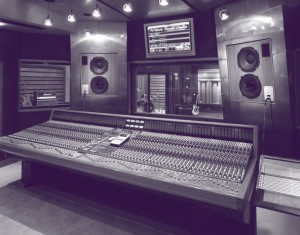Whether you’re a weekend warrior or a contract recording artist you should basically bring all this knowledge with you and apply it to your experience in the studio.
Remember the band that ran up the bar tab I was talking about? The same can be said about the studio. Don’t show up to a studio and drink and eat your way out of the place. If you put your feet up on your furniture at your place and eat your roommate’s food then you’re probably going to be that jackass that raids the studio fridge and disrespects the studio owner’s personal property.
I know of a band that kicked out their new singer because of this. They said whenever they auditioned him he was great. He sang great live and never caused that much of a problem. However, when they got into the studio he was a nightmare. He wouldn’t show up on time, he’d damage furniture with his inconsiderate way of lounging around, he drink all the liquor in the vicinity, and be a complete ass to the engineer. He’s now out of a band and I’ve yet to hear him front any new band.
Sure there were mitigating factors that also contributed to his ousting but there’s a reason why they told me the story about his manners in the studio. It’s because it’s embarrassing to the rest of the band when everyone else knows how to act like civilized human beings.
A great book to check out on what NOT to do in a studio situation is “The Daily Adventures of Mixerman.” http://www.amazon.com/Daily-Adventures-Mixerman/dp/0879309458
The Mixerman book is basically a fictionalized account of all these experiences that recording engineers go through: dealing with the A&R guy, the producer that never shows up, the different dynamics in band member mentalities, incompetent assistants, etc..
Being able to go to a high-end studio is great but not everyone can afford that. So having a home studio is what most musicians are resorting to. And having a home studio is very convenient as you can fire up a session anytime you’re ready. You can record at your own pace and not worry about hourly fees. However, if you’re a person that can only function with outside motivation it can be a problem.
A big part of the reason why I continually get asked to do jingles for commercials, music for movies, and music for television is because I can churn out music and mix it fast.
I’ve yet to encounter a director that has allotted enough time for the music composer to do the work in a reasonable amount of time. The number one thing I get asked is “how fast can you have this to me?” Which, of course, is followed up with, “can you make it sound like John Williams or Danny Elfman.”
Look, if you want it to sound like one of those guys then go hire one of those guys. And if you DO want it to sound as close as possible to those guys don’t expect a 24-hour turnaround on your investment.
One time I got a gig writing music for a short film. They wanted the music to be done and ready in about 3 days. I had it done the next day. I stayed up all night writing the music and mixing it and I was able to call them up the follow morning and say, “come check it out. It’s ready.”
They were blown away by what I had and by how fast I was able to do it. I’m not saying that your work should suffer for the sake of having something done quickly. You should always do quality work but also keep your mind on a goal and manage your time wisely. Don’t let your music become the equivalent of fast food. With that being said, don’t let your finished product fester in purgatory for weeks and months while you wait for the right artistic vibe to strike you.
There’s a story of a band I know that had gone through several singers. The first singer they had to kick out because it would take him forever to actually go to the studio to work on his vocals. When the vocals were done they sounded great but the investment in time they lost wasn’t worth it. Nothing is worse than hearing “when is the new CD going to be ready” from your fans and have to come up with an excuse at why it’s taking so long because you’re trying to not throw another member to the firing squad.
As a band you work at building up steam for your project. You work at building momentum and forward motion to accomplish other things. You work at building interest from fans, labels, and publications that are interested in your work. Nothing derails this momentum faster than stagnation of new content.
Keep a steady work flow and keep in mind that there are people counting on you to finish what you said you’d finish.
You know what else destroys a steady workflow and is counterproductive to a recording session? Your god damn girlfriend.
Look, I understand. I really do. There’s no better way to impress that lady than to drag her along to see a recording studio and to watch you lay down some history. But a girlfriend belongs in a recording session like a stray dog belongs in a class room. It distracts everyone. If you’re not busy trying to pet it then you’re busy trying to get its attention.

Girlfriends break up the monotony of day to day life in a studio but they also make the musician want to show off, overly defensive of their own ideas, and unfocused. Having a girl in the studio makes you want to play your solos faster, blow out your voice from singing too hard, and also makes those 5-minute-breaks last longer than they should.
“Yeah, so over here is the kitchen. Hey, does anyone want coffee? Me and Michelle are gonna make some coffee. Where’s the sugar? Oh, I know where the sugar’s at. The sugar’s right here, huh, babe? Hey babe, who’s got the sugar? You’ve got the sugar, huh?”
Alright!!! Enough of that bullshit. You’re making everyone sick.
And there’s no worse kind of studio girlfriend than the one that wants to pipe in with her opinion.
“I don’t know, I think it sounded good.”
Does it? Shut it.
“I can’t hear his backing vocals.”
“That’s cause we haven’t even gotten close to start mixing yet.”
Plus, there’s nothing more annoying than having to hear the tap tap tap of someone texting on their god damn cellphone because the recording process is way more boring than she thought. No, it’s not frustrating to have to deal with different musicians wanting different things while having to overhear someone talk on their cellphone to their BFF about how the new season of “The Bachelor” is going.
I could go on and on about how things should be done in a studio. I could make a whole treatise on being prepared, or how to channel your creative energy, or how to route your signal, etc.. But this is about studio etiquette. I can really sum up all of this by saying, “work really hard and don’t be an asshole.”
Treat the studio like you’re a guest. Because that’s what you are. They might try and accommodate you with snacks, and fancy decorations, but don’t strut in like you own the place. Be gracious and always leave the place looking better than the way you found it.



